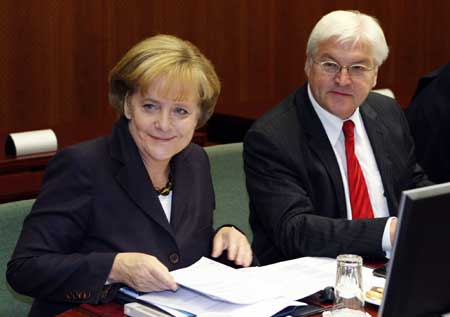
|
|
German Chancellor Angela Merkel and Foreign Minister Frank-Walter Steinmeier (R) arrive on the second day of a two-day European Union summit at the EU council headquarters in Brussels October 16, 2008. [Xinhua/Reuters Photo]
|
The EU will strengthen critical infrastructure, particularly trans-European energy transport networks and liquefied natural gas terminals.
Particular attention will be paid to interconnections and to the connection of the most isolated European countries, to the interface of European networks with supply infrastructure, and to the need to diversify both sources and routes.
The EU summit expressed support to the European Commission's initiative of establishing a plan of action to speed up interconnections in the Baltic region. A schedule of its work will be drawn up before the end of this year.
It will also further develop its energy relations with producer and transit countries.
For this purpose, a meeting of the Caspian Sea countries and transit countries will be organized by the EU's Czech presidency next spring.
On the stalled Lisbon Treaty, the summit listened analysis by Irish Prime Minister Brian Cowen on the rejection of the treaty Lisbon by his country's voters in June, the EU leaders decided to try to find out a solution at December's summit.
On climate change, Sarkozy said that the EU would reach an agreement on its climate-energy package before the end of the year.
"We will find a compromise for a big agreement" on the EU's package of energy and climate.
Several EU states showed reluctance to implement the package, which was proposed in January by the European Commission.
Under the package, by the year 2020, the EU must reduce by 20 percent greenhouse emissions, increase the rate of renewables' consumption to 20 percent and lower by 20 percent of traditional energy.
The summit adopted the European Pact Immigration and Asylum.